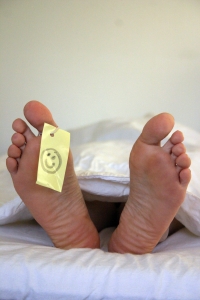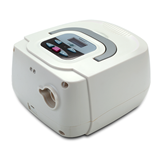It was several years before his death at the age of 82 and he'd survived the Second World war in Papua New Guinea, not to mention a triple-bypass after a series of heart attacks that began in his 40s.
Ron was adamant he owed the medical profession that had kept him alive a favour - so adamant he felt compelled to remind his family in the hours before he died.
"It was amazing because we were in the hospital with him and he was like, 'Now, have you called the university?" his daughter Diana recalls.
"He just didn't want anyone to change their mind afterwards."
Not that his family were surprised. Ron had been saying for years that was what he wanted, believing the surgery on his heart and on the leg which was wounded in PNG would be of interest to medical students.
Under the conditions of a donation, families can override a donor decision after a loved one's death.
Ron's family, like most, were happy to respect his wishes.
"Nobody would have gone against him," Diana says.
"He was a very humanitarian person and did a lot for people over the years.
"No one would have said, 'No, we're not going to do that'."
When it was announced this week that the prime minister's late father John Gillard had donated his body to science, university programs received a shot of publicity they otherwise do not seek.
There are no advertisements or recruitment drives, just online consent forms for those who express an interest and which are counter-signed by a donor's next of kin.
With or without the publicity, numbers are increasing in Australia.
"People do seem to be more willing to donate their bodies for these purposes," says the University of Sydney's head of anatomy, Associate Professor Kevin Keay.
"The numbers do seem to be increasing over the years, which is fabulous, and Australians are very special I think in that respect."
Figures for the country are difficult to pin down with no national registry existing.
But the University of Sydney accepts anywhere between 30 and 100 bodies each year. At the University of Melbourne it's around 150.
Adelaide University, in Mr Gillard's home town, has the highest per capita rate of donations in the country with around 80 per year and more than 6,000 registered.
People usually pledge their bodies years in advance, giving their families the chance to accept what will happen upon their death.
Ron's sense of community responsibility is a typical motive, says Associate Professor Keay.
"This is usually a decision that somebody has come to at a point in their life where they're not facing their imminent death," he says.
"It's really a considered decision that they want their remains to be used in a particular way.
"Often these are people who've had a great sense of responsibility to society and have been particularly giving people, and they want that sort of ethos of their life to be continued after their death."
A donation means forgoing the usual funeral, often in favour of a memorial service.
Bodies are expertly embalmed for their new purpose - study by anatomy students, vital practice for surgeons, or use in research, usually for several years.
Some body parts can be preserved in student museums for decades.
"It gives (students) a very unique opportunity to understand the three-dimensional relationships of body structures," Associate Professor Keay says.
"Even though all bodies contain the same things ... often they're put together slightly differently."
It's this side of the decision, though, that families can find confronting, Diana admits.
"We didn't want to think too much about it to tell you the truth, the details," she says.
"I have to say a couple of times I've thought about the head.
"I've just thought 'Dad's head, oh, what would they do?'
"The thing is he really believed strongly that once you die it's just a body, there's no spirit left, so why not be of use?"
Universities go to great lengths to emphasise the respect with which donor bodies are treated.
The ethics of their use are drummed into students, who are encouraged to remember the humanity of the tissue they are dealing with - and the gift to their learning that has been provided.
In Adelaide, the university invites the family members of donors to an annual memorial and dedication service.
"We encourage the students at the end of that service to actually mingle with the donor families," says University of Adelaide laboratory manager Wesley Fisk.
"This reinforces the fact that our donors have all had full and fruitful lives, they have families, they have loved ones and that everybody has to be treated with respect and dignity.
Associate Professor Keay says students need little reminding about respect.
"Students have that intrinsically," he says.
"They know that they're in a really special and unique position, that they're being given the opportunity by that individual to understand something in a way that is incomparable.
"You can't really learn anatomy form a textbook, you have to have a body in front of you."
Ron's decision has left an impression on his four grown-up children, who are registered organ donors and will consider following their father's example.
"Knowing my family, I'm sure we would all tick the box," Diana says.
"I just think it's a really selfless decision to make, to do something like that.
"The same as donating organs or giving blood, they're so needed.
"It's a pity more people don't do it.
"When I read that about (Julia) Gillard's father I thought, 'What a great thing to do."
- Suppliers
- New to MedicalSearch? Book a Demo
- Advertise with us
- Login
- Email Marketing
- Buyers
- Get Quotes
- Articles & Ideas
- Login
- Subscribe to newsletter
- My Details
- Get Quotes
- Accident & Emergency Care
- Aged Care & Disability
- Anaesthesia & Respiratory Care
- Beauty & Wellness
- Cardiology & Cardiac Surgery
- Commercial Cleaning & Laundry Supplies
- Dental Care & Oral Surgery
- Diagnostic Instruments & Medical Imaging
- Disinfection & Sterilisation
- ENT & Audiology
- Gynaecology & Obstetrics
- Homecare & Consumer Medical
- Hospital Equipment & Supplies
- Intensive Care Unit
- Laboratory & Pathology
- Medical Apparel
- Medical Devices & Products
- Medical Fridges & Freezers
- Medical Storage & Filing
- Medical Waste Management
- Optometry & Ophthalmology
- Orthopaedics & Podiatry
- Paediatrics & Neonatology
- Patient Monitoring & Management
- Physiotherapy & Rehabilitation
- PPE & Infection Control
- Single Use Medical Consumables
- Surgical Tools & Supplies
- Treatment Beds, Tables & Couches
- Veterinary Equipment
- Wheelchairs & Mobility Aids
- Get Quotes
- Accident & Emergency Care
- Aged Care & Disability
- Anaesthesia & Respiratory Care
- Beauty & Wellness
- Cardiology & Cardiac Surgery
- Commercial Cleaning & Laundry Supplies
- Dental Care & Oral Surgery
- Diagnostic Instruments & Medical Imaging
- Disinfection & Sterilisation
- ENT & Audiology
- Gynaecology & Obstetrics
- Homecare & Consumer Medical
- Hospital Equipment & Supplies
- Intensive Care Unit
- Laboratory & Pathology
- Medical Apparel
- Medical Devices & Products
- Medical Fridges & Freezers
- Medical Storage & Filing
- Medical Waste Management
- Optometry & Ophthalmology
- Orthopaedics & Podiatry
- Paediatrics & Neonatology
- Patient Monitoring & Management
- Physiotherapy & Rehabilitation
- PPE & Infection Control
- Single Use Medical Consumables
- Surgical Tools & Supplies
- Treatment Beds, Tables & Couches
- Veterinary Equipment
- Wheelchairs & Mobility Aids
Trusted by 520,000 Australian medical buyers
Buyers
- Discover products & solutions
- Login
- Subscribe To Newsletter
- Browse All Products
- Read Articles
Suppliers
Advertise
- Promote your products & solutions
- New to MedicalSearch? Book a Demo
- Login / Forgot Password
- Advertise Your Products
- Success Stories
- Email Marketing
- Suppliers
- Advertise with us
- Login
- Email Marketing
- Buyers
- Get Quotes
- Articles & Ideas
- Login
- Subscribe to newsletter
- My Details
Get Quotes
- Accident & Emergency Care
- Aged Care & Disability
- Anaesthesia & Respiratory Care
- Beauty & Wellness
- Cardiology & Cardiac Surgery
- Commercial Cleaning & Laundry Supplies
- Dental Care & Oral Surgery
- Diagnostic Instruments & Medical Imaging
- Disinfection & Sterilisation
- ENT & Audiology
- Gynaecology & Obstetrics
- Homecare & Consumer Medical
- Hospital Equipment & Supplies
- Intensive Care Unit
- Laboratory & Pathology
- Medical Apparel
- Medical Devices & Products
- Medical Fridges & Freezers
- Medical Storage & Filing
- Medical Waste Management
- Optometry & Ophthalmology
- Orthopaedics & Podiatry
- Paediatrics & Neonatology
- Patient Monitoring & Management
- Physiotherapy & Rehabilitation
- PPE & Infection Control
- Single Use Medical Consumables
- Surgical Tools & Supplies
- Treatment Beds, Tables & Couches
- Veterinary Equipment
- Wheelchairs & Mobility Aids
Get Quotes
- Accident & Emergency Care
- Aged Care & Disability
- Anaesthesia & Respiratory Care
- Beauty & Wellness
- Cardiology & Cardiac Surgery
- Commercial Cleaning & Laundry Supplies
- Dental Care & Oral Surgery
- Diagnostic Instruments & Medical Imaging
- Disinfection & Sterilisation
- ENT & Audiology
- Gynaecology & Obstetrics
- Homecare & Consumer Medical
- Hospital Equipment & Supplies
- Intensive Care Unit
- Laboratory & Pathology
- Medical Apparel
- Medical Devices & Products
- Medical Fridges & Freezers
- Medical Storage & Filing
- Medical Waste Management
- Optometry & Ophthalmology
- Orthopaedics & Podiatry
- Paediatrics & Neonatology
- Patient Monitoring & Management
- Physiotherapy & Rehabilitation
- PPE & Infection Control
- Single Use Medical Consumables
- Surgical Tools & Supplies
- Treatment Beds, Tables & Couches
- Veterinary Equipment
- Wheelchairs & Mobility Aids
Trusted by 520,000 Australian medical buyers


